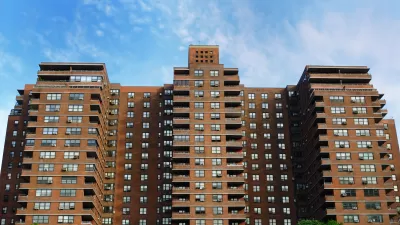In The Real Deal, HUD administrator Lynne Patton hints at a 10-point plan for New York and New Jersey.
Five months into her appointment, regional administrator Lynne Patton joined The Real Deal to defend the administration's "business perspective" and preview a regional policy agenda.
Here are some of the priorities Patton identifies for New York and New Jersey:
- Keeping Private Activity Bonds—loans that finance private development—in the tax reform package. "There's nothing more critical and important to me," Patton says.
- Strengthening job training and placement programs like Section 3 and NYCHA's Jobs-Plus in hopes of getting people out of public housing.
- Selling public housing stock to the private sector—potentially for conversion to market rate. "It's certainly no secret that NYCHA's public housing properties sit on some of the most valuable real estate in New York City. How [developers] choose to leverage that is really up to them," Patton suggests.
Highlighting her monthly meetings with development and real estate industry groups, Patton explains that the proposed policies are part of an overarching effort to empower the private sector. "This administration is extremely developer-friendly given the President's background," she says.
The flip side of that agenda is shrinking public programs, particularly long-term ones, in the interest of fostering "financial independence" among aid recipients. Patton also defends the administration's proposal to reduce HUD funding, framing it as "the efficient and effective allocation of taxpayer dollars." Experts have warned that now is the worst time to cut housing assistance.
A former executive at the Eric Trump Foundation with no experience in public housing, Patton was a controversial choice to lead HUD's New York and New Jersey region. Critics also noted that her appointment coincided with the abrupt dismissal of a Fair Housing case in Westchester County, where she is a resident.
Previous Planetizen coverage of HUD's agenda can be found here, here, and here.
FULL STORY: What does Lynne Patton want?

Montreal Mall to Become 6,000 Housing Units
Place Versailles will be transformed into a mixed-use complex over the next 25 years.

Planetizen Federal Action Tracker
A weekly monitor of how Trump’s orders and actions are impacting planners and planning in America.

DARTSpace Platform Streamlines Dallas TOD Application Process
The Dallas transit agency hopes a shorter permitting timeline will boost transit-oriented development around rail stations.

Without International Immigrants, the Rural US Population Would Be Falling 58%
Census data shows that population growth in rural areas is due in large part to international migrants.

Dead End: Nine Highways Ready for Retirement
The Freeways Without Futures report describes the nation’s most promising highway removal proposals.

Congressman Proposes Bill to Rename DC Metro “Trump Train”
The Make Autorail Great Again Act would withhold federal funding to the system until the Washington Metropolitan Area Transit Authority (WMATA), rebrands as the Washington Metropolitan Authority for Greater Access (WMAGA).
Urban Design for Planners 1: Software Tools
This six-course series explores essential urban design concepts using open source software and equips planners with the tools they need to participate fully in the urban design process.
Planning for Universal Design
Learn the tools for implementing Universal Design in planning regulations.
City of Mt Shasta
City of Camden Redevelopment Agency
City of Astoria
Transportation Research & Education Center (TREC) at Portland State University
City of Camden Redevelopment Agency
Municipality of Princeton (NJ)
Regional Transportation Commission of Southern Nevada




























